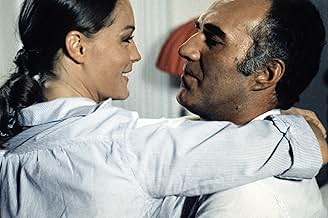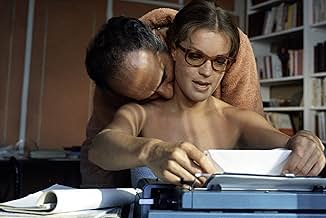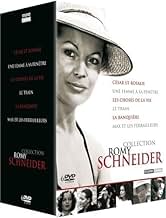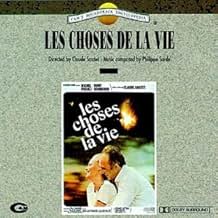Un architecte est victime d'un accident de voiture, après lequel, inconscient, il se remémore les évènements de sa vie qui ont mené à l'accident.Un architecte est victime d'un accident de voiture, après lequel, inconscient, il se remémore les évènements de sa vie qui ont mené à l'accident.Un architecte est victime d'un accident de voiture, après lequel, inconscient, il se remémore les évènements de sa vie qui ont mené à l'accident.
- Prix
- 1 victoire et 2 nominations au total
Avis en vedette
10rutel
Yesterday (Dec 15, 2001 I saw "Intersection" (with Richard Gere and Sharon Stone), so, I immediately wanted to see the original and ... there is no place like home. I went to a Blockbuster and, once again, the original is much better. Try to see it and you wont regret
A typical 70's drama, something that still gets its way when it comes to touch that emotional key in us (Or some of us) and makes us long for that passionate love story, without a tragic end of course. Through a filter of pastel tones, Sautet portrays the typical struggle many have put themselves through to fork onto a secondary sentimental route in life, thinking they can have it both ways. Albeit its apparent sappy tone, Les Choses de la Vie is an intense mature story of love and sacrifice, a double one at the end.
I find European dramas very attractive, perhaps because they portray a kind of no-frills passion that is very hard to come across nowadays, both in movies and in reality. A movie like this surely has its clichés, the dual life, the regrets, the tragic death but in this movie Sautet is a wizard in enfolding the viewer with a very bitter-sweet sequence of happy yet solemn flashbacks. Pedro Lazaga's Largo Retorno (1975) happens to be similar in the way the relationship between the two main characters comes to an end (The memories, the sorrow, the death), granted in Les Choses de la Vie there is a three-way story. Both Michel Piccoli and Romy Schneider fit perfectly in the above scheme of things.
Just like in Largo Retorno, a very somber yet passionate baroque score complements the entire movie, leaving us with a soggy handkerchief at the end.
I find European dramas very attractive, perhaps because they portray a kind of no-frills passion that is very hard to come across nowadays, both in movies and in reality. A movie like this surely has its clichés, the dual life, the regrets, the tragic death but in this movie Sautet is a wizard in enfolding the viewer with a very bitter-sweet sequence of happy yet solemn flashbacks. Pedro Lazaga's Largo Retorno (1975) happens to be similar in the way the relationship between the two main characters comes to an end (The memories, the sorrow, the death), granted in Les Choses de la Vie there is a three-way story. Both Michel Piccoli and Romy Schneider fit perfectly in the above scheme of things.
Just like in Largo Retorno, a very somber yet passionate baroque score complements the entire movie, leaving us with a soggy handkerchief at the end.
I loved the novel . And I was seduced by the film. Because it represents more than a good adaptation.
First, it is a beautiful new demonstration of the art of Claude Sautet to explore facts behind the silence veil, from the complexity of relation to the vulnerabilities and certitudes, the basic traits of bourgeous life and the spirit of family, the loneliness and the game of apparences.
Second, for the great acting .
Not the last, for the powerful scenes, the most intense remaining the wedding and the ship ignoring him. Romy Schneider is just admirable in each scene, few of them reminding The assasination of Trotsky.
More than a good adaptation, it is a poem about essence of life, about regrets, decissions and force / meanings of love. And , sure, about the cold plus tard.
One of the most impressive virtues, the scenes of accident , splendid because, reading, years ago, the novel, I believed than that scenes are impossible to be proposed by a film . But, I ignored the gifts of a Claude Sautet.
First, it is a beautiful new demonstration of the art of Claude Sautet to explore facts behind the silence veil, from the complexity of relation to the vulnerabilities and certitudes, the basic traits of bourgeous life and the spirit of family, the loneliness and the game of apparences.
Second, for the great acting .
Not the last, for the powerful scenes, the most intense remaining the wedding and the ship ignoring him. Romy Schneider is just admirable in each scene, few of them reminding The assasination of Trotsky.
More than a good adaptation, it is a poem about essence of life, about regrets, decissions and force / meanings of love. And , sure, about the cold plus tard.
One of the most impressive virtues, the scenes of accident , splendid because, reading, years ago, the novel, I believed than that scenes are impossible to be proposed by a film . But, I ignored the gifts of a Claude Sautet.
By watching this 1969 movie, I have just confirmed my opinion about Claude Sautet: that's one Director that takes the expectator "inside the scene" (As seen in his latest work: Nelly and Mr.Arnaud). He has this ability that allows him to "extract" the most of his characters in the psychologic aspect, by showing all the range of their feelings...Take the scene where Pierre Berard (portrayed by Michel Piccoli) tells Héléne (played by Romy Schneider) of his sudden decision of no longer accompany her on a trip planned ages ago. Another scene that worths appears in a record as a "Death Scenes Hall of Fame" is the one in which Pierre lays on the grass, his thoughs exposed as the expectator follows him, in all his emotional suffering. Claude Sautet: a Director that deserves having his name written in the "Hall of Fame of the Greatest Directors of All Times". As an "homage" to him, in a scale of 10, I grade this film 9.
With "les choses de la vie" ,Claude Sautet relinquished his former style ,film noir ("classes tous risques" "l'arme à gauche" both worth seeking)in favor of bourgeois psychological dramas .
"Les choses de la vie" was the first link on the chain,and -with the exception of "Max et les ferrailleurs" (1971),which showed Sautet at the height of his powers,when he came back for a short while to his first inspiration-remains the best of this "cinema de qualité".
Unlike the other works ("Mado" "Cesar et Rosalie" "Vincent,François,Paul et les autres" "une histoire simple" ,etc etc etc) ,"les choses de la vie" has an emotional power and an unusual inventive direction.Editing is stunning (the first picture is one wheel of the car ),and never a car accident was filmed with such mastery.Flashbacks are used with great skill too.The nightmare scene (the wedding) remains very impressive today.And the metaphorical way Sautet uses to depict the hero's death commands respect and admiration.The last part of the movie is almost completely silent,but the strength of the pictures and the actors' talent (Piccoli,Schneider,but Lea Massari and Jean Bouise too)work wonders.Superb score.louis Delluc prize.
Remake :"intersection" featuring Richard Gere.As I cannot say something nice...
"Les choses de la vie" was the first link on the chain,and -with the exception of "Max et les ferrailleurs" (1971),which showed Sautet at the height of his powers,when he came back for a short while to his first inspiration-remains the best of this "cinema de qualité".
Unlike the other works ("Mado" "Cesar et Rosalie" "Vincent,François,Paul et les autres" "une histoire simple" ,etc etc etc) ,"les choses de la vie" has an emotional power and an unusual inventive direction.Editing is stunning (the first picture is one wheel of the car ),and never a car accident was filmed with such mastery.Flashbacks are used with great skill too.The nightmare scene (the wedding) remains very impressive today.And the metaphorical way Sautet uses to depict the hero's death commands respect and admiration.The last part of the movie is almost completely silent,but the strength of the pictures and the actors' talent (Piccoli,Schneider,but Lea Massari and Jean Bouise too)work wonders.Superb score.louis Delluc prize.
Remake :"intersection" featuring Richard Gere.As I cannot say something nice...
Le saviez-vous
- AnecdotesCigarette count: 46
- GaffesIn the car crash scene, the stunt double for Michel Piccoli is seen wearing brown gloves in close-ups. However Piccoli is bare-handed while driving.
- ConnexionsFeatured in Claude Sautet ou La magie invisible (2003)
Meilleurs choix
Connectez-vous pour évaluer et surveiller les recommandations personnalisées
- How long is The Things of Life?Propulsé par Alexa
Détails
Box-office
- Brut – États-Unis et Canada
- 5 063 $ US
- Brut – à l'échelle mondiale
- 5 063 $ US
- Durée
- 1h 29m(89 min)
- Mixage
- Rapport de forme
- 1.66 : 1
Contribuer à cette page
Suggérer une modification ou ajouter du contenu manquant





























